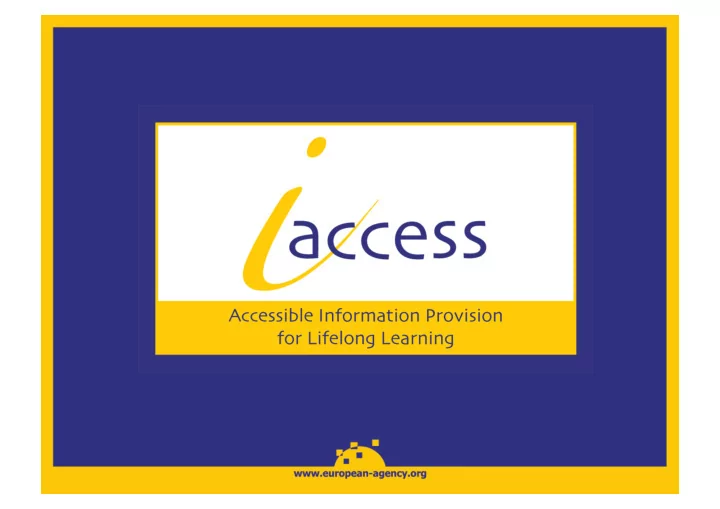

i-access Accessible information provision for lifelong learning Project Presentation
Agency History ● 1996 - established as an initiative of the Danish Ministry of education following the end of the EU HELIOS programme ● 1999 - the original 15 member countries ‘ took ownership ’ of the Agency ● 2003 - the Agency obtained a legal basis at the European level that was approved by the European Parliament
Currently 15th year of operations ● Main secretariat in Odense, Denmark and ● European Liaison office in Brussels, Belgium
The Agency network ● National networks in 27 European countries: Austria, Belgium (Flemish and French speaking communities), Cyprus, Czech Republic, Denmark, Estonia, Finland, France, Germany, Greece, Hungary, Iceland, Ireland, Italy, Latvia, Lithuania, Luxembourg, Malta, Netherlands, Norway, Poland, Portugal, Slovenia, Spain, Sweden, Switzerland, United Kingdom (England, Northern Ireland, Scotland and Wales)
Funding The Agency is financed by: • The member countries ’ Ministries of Education • European Commission as one of the 6 organisations supported by the Jean Monnet, Lifelong Learning Programme
Mission ● The Agency is a permanent network of ministerial representatives acting as the member countries ’ platform for collaboration regarding the promotion of quality and equity in education as a means to achieving social cohesion ● The Agency has a mandate from the Ministers of Education in the member countries to facilitate collaboration regarding country priorities that are in line with the Council priorities as identified in the ET 2020 strategy and in accordance with international agreements such as the UN Convention on the Rights of Persons with Disabilities (2006)
Focus (1) ● The Agency ’ s main focus is upon inclusive education within its widest interpretation – that is dealing with learner difference and diversity in all educational settings as a quality issue. The Agency ’ s work is essentially concerned with how the achievement of all learners at all levels of inclusive lifelong learning can be improved in a meaningful way that enhances their life chances and opportunities for actively participating in society
Focus (2) In order to account for the heterogeneity of contexts and approaches in member countries, Agency projects and activities take a broad view of inclusive education as a systemic approach to meeting the needs of all learners, with a specific focus on the particular situation of those pupils identified as having special educational needs
Context ● The Agency works to a multi-annual work programme (2007 – 2013) ● All Agency activities are in alignment with European Council priorities and objectives for education ● All projects and activities are identified via Agency representatives as being priority for their countries
Activities ● Collection, analysis and dissemination of information on priority themes ● Participation and organisation of conferences, seminars and political events ● Liaison with the European institutions and international organisations – UNESCO and its institutes (IBE, IITE), OECD Eurostat, Eurydice, Cedefop, World Bank
Information Resources The Agency offers various information resources, which can all be accessed via the website www.european-agency.org – Thematic Reports – Thematic Databases – Newsletters and Electronic Bulletin Agency publications can be downloaded in up to 21 member languages
Agency Publications
Background for i-access ● The UN Convention on the Rights of Persons with Disabilities (CRPD) 2006; ● Digital Agenda for Europe (May 2010); ● Key information providers within Lifelong Learning need clear guidance on implementing accessibility policy into practice; ● Agency position: main barrier is not lack of ICT solutions, but guidance on what policy implies and how this can be implemented effectively.
What is i-access? ● i-access stands for “information - accessibility” ● This includes access to all forms of information: – Websites and web tools – Electronic and print files – Various forms of media – Contact with organisations
What is i-access? Cont. ● i-access is more then technology, it is also about how technology is embedded in suitable organisational processes to provide the organisation's target groups with a fully accessible interaction experience
i-access Project Aims: ● Raising awareness of the importance of providing information for learning which is accessible for all; ● Develop recommendations for implementing accessibility policy for information provided for learning. Project Objectives: ● Hosting a European conference, bringing together key information providers, representatives of stakeholder groups of accessible ICT to agree recommendations for implementing accessibility policy; ● Disseminating the conference outcomes at European and National level.
Project Management ● The project follows Agency Project Management and Quality Assurance Procedures ● Project Advisory Group (PAG): staff team; Danish Representative Board Member, Jacob Hess; External Project Adviser: Dónal Rice ● i-access project team: András Lenárt, Mette Thrane Pedersen, Marcella Turner, Harald Weber
Project Participants From each Agency member country: – One education policy expert and – One multiplier (researcher or journalist). For the i-access conference this will extend to: ● Guests, ● Co-operation partners, ● Representatives of stakeholder groups working with accessible ICT.
Project Outputs ● Project web area; ● i-access conference; ● Conference package; ● Conference report; ● i-access recommendations; ● Dissemination package (including press release texts and template presentations); ● Collection of examples of National level dissemination.
Recommend
More recommend